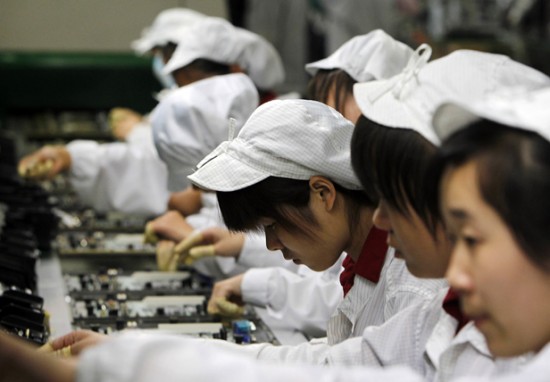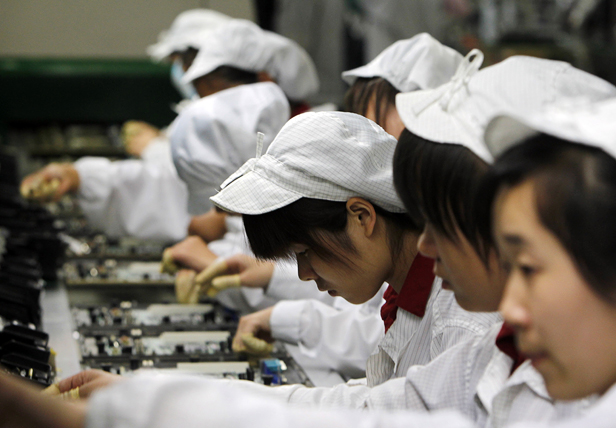Business Impact
Migrant Workers in China Face Competition from Robots
China’s giant electronics supplier Foxconn eyes replacing workers with industrial robots.



One of the defining narratives of modern China has been the migration of young workers—often girls in their late teenage years—from the countryside into sprawling cities for jobs in factories. Many found work at Foxconn, which employs nearly one million low-wage workers to hand-assemble electronic gadgets for Apple, Nintendo, Intel, Dell, Nokia, Microsoft, Samsung, and Sony.
So it was a surprise when Terry Guo, the hard-charging, 61-year-old billionaire CEO of Foxconn, said last July that the Taiwan-based manufacturing giant would add up to one million industrial robots to its assembly lines inside of three years.
The aim: to automate assembly of electronic devices just as companies in Japan, South Korea, and the United States previously automated much of the production of automobiles.
Foxconn, one of China’s largest private employers, has long played an outsize role in China’s labor story. It has used cheap labor to attract multinational clients but now faces international scrutiny over low pay and what some see as inhumane working conditions.
“Automation is the beginning of the end of the factory girl, and that’s a good thing,” says David Wolf, a Beijing-based strategic communications and IT analyst. Wolf, who has visited many Chinese factory floors, predicts an eventual labor shift similar to “the decline of seamstresses or the secretarial pool in America.”
Since the announcement, Guo hasn’t offered more details, keeping observers guessing about whether Foxconn’s plans are real. (Through its public-relations firm, Burson-Marsteller, Foxconn declined to describe its progress.) Trade groups also haven’t seen the huge orders for industrial robots that Foxconn would need, although some experts believe the company may be developing its own robots in house.
“Guo has good reasons for not waving his flag about this too much,” says Wolf. Keeping quiet could give Foxconn a jump on competitors. What’s more, with the Chinese economy slowing down, “it is politically inadvisable to talk too much about replacing people with robots,” he says.
China’s leaders see employment as essential to maintaining a harmonious society. The imperative of creating jobs often trumps that of efficiency. For instance, Wang Mengshu, deputy chief engineer at China Railway Tunnel Group, says that labor-saving equipment isn’t always used even when it’s available. “If all the new tunnels were built with the advanced equipment, that would trim the need for the employment of about six million migrant workers,” he says. “In certain fields we don’t want to have fast development in China, in order to solve the national employment problem.”
 About 300,000 Chinese workers currently live in dormitories at Foxconn’s Longhua factory complex, where Apple products are assembled. Most spend their days seated beside a conveyer belt, wearing white gowns, face masks, and hairnets so that stray hairs and specks of dust won’t interfere as they perform simple but precise tasks, again and again. Each worker focuses on a single action, like putting stickers on the front of an iPhone or packing a finished product into a box. As managers told ABC’s Nightline, which aired a rare look inside the factory in February, it takes five days and 325 steps to assemble an iPad.
About 300,000 Chinese workers currently live in dormitories at Foxconn’s Longhua factory complex, where Apple products are assembled. Most spend their days seated beside a conveyer belt, wearing white gowns, face masks, and hairnets so that stray hairs and specks of dust won’t interfere as they perform simple but precise tasks, again and again. Each worker focuses on a single action, like putting stickers on the front of an iPhone or packing a finished product into a box. As managers told ABC’s Nightline, which aired a rare look inside the factory in February, it takes five days and 325 steps to assemble an iPad.
Such highly structured and predictable tasks are well suited to automation, says Jamie Wang, a Taipei-based analyst for the research firm Gartner. Industrial robots, typically equipped with a movable arm, use lasers or pressure sensors to know when to start and finish a job. A robot can be operated 160 hours a week. Even assuming competition from nimble-fingered humans putting in 12-hour shifts, a single robot might replace two workers, and possibly as many as four.
Wang stresses that Foxconn can’t replace human workers right away because automating assembly lines would require rejiggering its entire manufacturing process. Larger changes in China also won’t occur overnight. Smaller Chinese factories can’t afford to invest in robotics, and factory wages are still relatively low—about $315 to $400 per month in the Pearl River Delta, according to Liu Kaiming, director of a Shenzhen-based labor organization called the Institute of Contemporary Observation.
Despite that, Foxconn isn’t the only Chinese manufacturer betting on robots. The International Federation of Robotics, based in Frankfurt, tracked a 50 percent jump in purchases of advanced industrial robots by Chinese manufacturers in 2011, to 22,600 units, and now predicts that China will surpass Japan as the world’s largest market in two years. It’s obvious, Wolf says, that industrial robotics “is about to get very hot in China.”